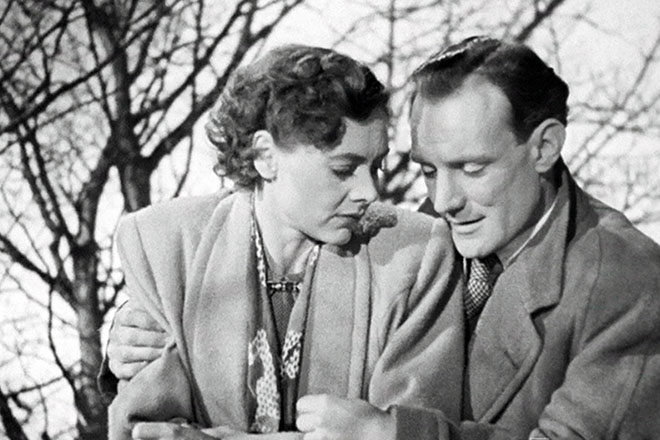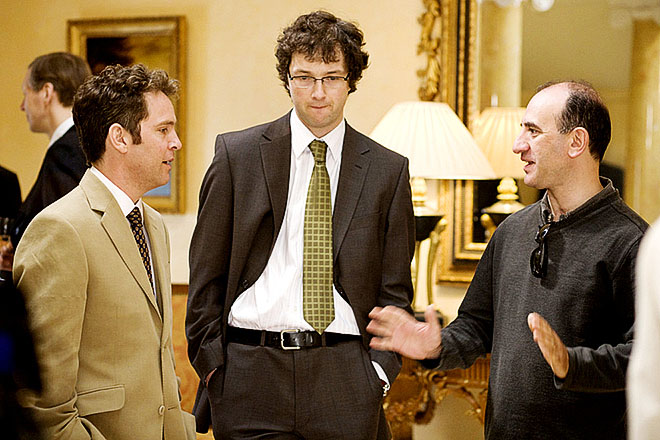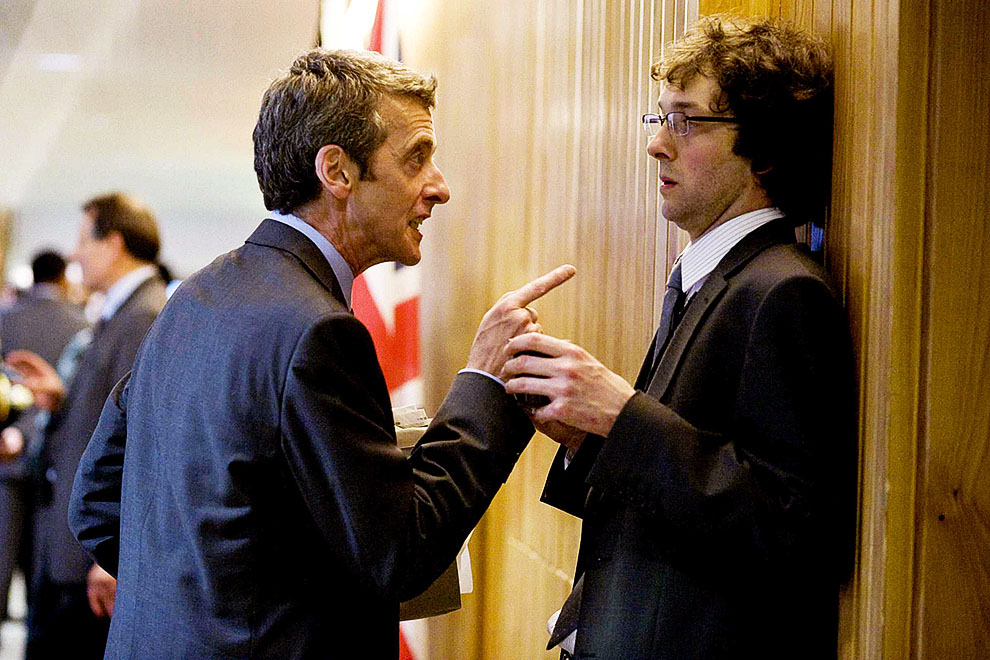What? No Michael Powell? And a chapter on “B” films? In a book about twenty British films to cherish? What is going on here?
These are the questions some readers will ask when they pick up a copy of my new book, Twenty British Films: A Guided Tour. Inevitably, any choice of this kind is strongly personal – and so is any defence of that choice. In this case, the selection is based on the notion of films that have remained fresh and provocative for me after multiple viewings. These are films that stay in the mind, sometimes over decades, when hundreds of others are forgotten. They speak of a rich national cinema too often undervalued as if it were a poor relation of Hollywood.
Alongside the element of celebration, I also wanted to look closely at the twenty films both in their contexts and as individual achievements. Sometimes, I was motivated to write about a film that didn’t seem to me to have had the attention it deserves; and sometimes I decided not to write about a film that has been much discussed but about which I felt I didn’t have anything new to add. Each of the films I chose highlights something about British cinema that seems important to me: its strong ties with literature, for instance, or the fact that it represents a high spot in British comedy or crime drama. Or it could be a matter of rescuing a “B” film from obscurity and critical condescension, or of celebrating a star performance.
I hope the reasons for the inclusion of each film will be clear to readers, but this clarity is not achieved by adopting a uniform approach throughout. I admire A Portrait of the Artist, for instance, for the way it brings Joyce’s great novel to such visual life – and for its daring to submit the filmgoer to so much argument about ideas of art and religion and sex. Above all, these are films that remain – and grow – in the memory, films that have indeed enriched lives. Mine, at least.
The twenty? They are The Lady Vanishes (1938), Pygmalion (1938), The Way Ahead (1944), Brief Encounter (1945), Great Day (1945), Temptation Harbour (1947), It Always Rains on Sunday (1947), The Third Man (1945), Genevieve (1953), Private Information (1952), A Kind of Loving (1962), Cash on Demand (1963), The Servant (1963), Women in Love (1969), Get Carter (1970), A Portrait of the Artist as a Young Man (1977), Dreamchild (1986), Four Weddings and a Funeral (1994), Secrets and Lies (1996), Wonderland (1998), Last Orders (2002) and In the Loop (2009). (That’s twenty-two actually, for reasons I reveal in the book.)
And here are extracts from my essays about two of them.
The long-lasting Brief Encounter (1945)
When I was being interviewed a few years back about an earlier book of mine I was asked if I had a favourite British film. This was impossible to answer off the top of my head, so I fudged by saying, “Not sure about a favourite, but the most British film ever seems to me to be Brief Encounter.” It’s hard to imagine this film having been made anywhere else – and, perhaps, by British I really mean “English.”
The film begins with a night shot of the railway station behind the credits. Rachmaninoff’s powerfully romantic second piano concerto comes up on the soundtrack, and after this I’m more or less unable to stop watching. And once the camera lights on Celia Johnson’s face, eloquent with what seems – and proves to be – suppressed misery, her emotional life trapped behind those eyes, I’m utterly caught. Who are these rather ordinary-looking people, not looking at all like film stars, sitting at a table in the railway buffet in mute and mutually felt pain, and what has brought them to this point? The contrast of Laura and Alec, as we’ll learn they are, with the comic station staff and Everley Gregg’s gossiping Dolly reinforces our attention, as does the stillness of Johnson and Trevor Howard.
Johnson and, especially, Howard, were scarcely known as film stars in 1945. Johnson had appeared in three films – In Which We Serve (1942), Dear Octopus (1943) and, this time starring, This Happy Breed (1944) – but Howard had had only an uncredited bit part in The Way Ahead (1944) and a small role in The Way to the Stars (1945). At the time of Brief Encounter they were more or less unknown quantities to cinemagoers, but this film gave them what is probably (to use that much misused word) iconic status. Celebrated American director Robert Altman claimed that it was “the first film that made the difference in my mind between a movie and a film... This girl, Celia Johnson, was not pretty. She wore those sensible shoes. And suddenly I’m in love with her.” A tribute indeed.

A quality of stillness: Celia Johnson and Trevor Howard in Brief Encounter.
But there’s more to it than the night and the stars and the music. Brief Encounter may be absolutely a film of its time, and the specifics of the conflict in which Laura and Alec find themselves may no longer hold. But the underlying ideas and imperatives work as potently as ever. As a story of love at odds with everyday responsibilities and accepted conventions, Brief Encounter undoubtedly still has the power to move us. Alec may say, “We know we love each other – that’s all that really matters,” but Laura knows better when she replies, “It’s not all that really matters. Other things matter too,” and she means self-respect, as well as what is owed to others.
Does it still work? Obviously it does. Just think of the number of times it is “quoted” in later films. One of the most recent occurs for the brief moment in Brick Lane (2007) when we are in a house in London’s East End and the television is playing but no one is watching. Screening is the scene from Brief Encounter in which Fred, the prosaic husband of Laura (Celia Johnson), is asking her to turn down the music a little just after she has recalled the moment when Alec (Trevor Howard) told her, “I love you so.” It is all quite fleeting, but it subtly points us to how we should be reading Sarah Gavron’s touching film about a Bangladeshi woman, married to a kind, dull older man, who falls tremulously in love with a young sewing-machine repairman.
This moment reminded me of how often Brief Encounter has been called into play in other films – A Touch of Class (1973) and Truly Madly Deeply (1990), for instance, in which key extracts are glimpsed, and The History Boys (2006), in which two schoolboy characters act out an affectionate parody of the movie’s ending. Is it the archetypal film-rendering of the unexpected love that surprises the people in Brick Lane, a love they turn away from, as Laura and Alec did sixty-two years earlier?
Another small bit of evidence for the film’s durability came my way in the 1990s, when I was regularly teaching a course on British cinema. I was invariably impressed by how well it was received by students born several decades after the film’s release. I had been prepared for an element of cynicism, maybe even derision, about how much things had changed. But the only hint of this occurred when they laughed as poor distraught Laura wanders the night streets and her voiceover says (as if to her husband), “Oh Fred, I know you disapprove of women smoking in the street.” Another twenty years later, of course, anyone smoking in the street would be an object of disapproval, or worse.
In your face: In the Loop (2009)
We – or at any rate British cinema – have come a long way since Brief Encounter. Celia Johnson had only taken off her scarf when her assignation with Trevor Howard was interrupted by the return of the owner of his friend’s flat. Sex scenes of the kind routinely on show today would have been unthinkable, and were probably not even so common in life – prior to the spread of central heating, anyway, but that’s another matter.
But it’s not sex that comes to mind in relation to In the Loop, which originated in the TV series The Thick of It. It’s the language. At a rough guess, I should say that the word “fuck” in its various permutations and tenses occurs about 976 times, or maybe more. It reaches the stage where we almost cease to be aware of it, as if we have become anaesthetised to its use. I don’t raise this issue in a spirit of censoriousness, but rather to register my sense of the film’s literacy. It’s not literary in any sense, but the film convinces me that it is literate, true, that is, to the way we can believe these people talk in the everyday hurl and burl of their lives. One critic finished his review of the film by announcing unequivocally: “A magnificent film.” I’m prepared to go along with this.
Has there ever been a seriously good film derived from a television series? I haven’t done the research that would enable me to answer this question with authority, but when I run my eye over the list compiled for Wikipedia I am not at all inclined to viewing the big-screen likes of The Beverly Hillbillies or On the Buses just to be sure of my ground. Cinema would hardly have got off the ground without film-makers pillaging novels, plays, short stories, even a few poems, or using scripts “based on a true story,” and many stimulating movies have resulted. So what is it about TV series that seems so endemically to resist the process of adaptation from the small to the big screen? Perhaps it is to do with running time: whereas a smartly written half-hour series can run satisfactorily on a single idea, dressed out with shrewdly calculated observation of milieu and lives fleetingly glimpsed, the feature film needs much more clotted plotting.

Almost breathtaking: Tom Hollander and Chris Addison with director Armando Iannucci on the set of In the Loop.
There must be exceptions to this depressing rule. I seem to remember Sweeney! (1977) managed the transfer from TV with a rewarding share of tough action and tough insights. Those with longish memories may also recall that some of the anarchic insanity of Monty Python made its way to the big screen with the original inspiration intact. And Kevin Macdonald’s 2009 version of the riveting British series State of Play (2003) didn’t lose too much in having its investigation of the links between politics and press relocated from London to Washington. But we all know what exceptions can do to rules.
What all this means is that director Armando Iannucci, in his feature debut, has pulled off a major triumph with In the Loop. He directed thirteen of the TV episodes between 2005 and 2012, as well as producing and co-writing most of them – and played a similar role in the lethally deadpan Alan Partridge series, from which he is currently making a feature film. He begins to seem like a polymath of early twenty-first-century television.
Why does In the Loop work so well when most of its predecessors in the small-to-big-screen transfer don’t? I probably should admit to a prejudice here. Political satire may well be my favourite genre – either that or westerns. But there’s not all that much in the way of political satire that comes our way, especially not when it is treated with such non-stop irreverence as it is in this film. There have been enjoyable instances of what I more or less mean in such films as Bob Roberts (1992), Primary Colors (1998) and especially Wag the Dog (1997) in fairly recent times, but this film may just be smarter and funnier than any of them.
In the Loop belongs to the nasty vein of television I most enjoy, though this may well show me in a poor light. I mean programs like The Thick of It and The Office. I don’t just mean “nasty”; I mean “smart and nasty,” with a finger on the pulse for the way things go on in life. In this case, it means the profession of spin-doctoring among assorted politicians on both sides of the Atlantic and the forces behind the push towards war in the Middle East.
Like all the best comedy, In the Loop is at heart serious. Not that you might have time to notice this while watching; the laughs come thick and fast and the irreverence and profanity are almost breathtaking. Iannucci doesn’t actually name political parties or real politicians. If he did, the ensuing litigation would no doubt have impoverished him for decades. It is nonetheless clear that the political issue involved is whether or not the West – that is, essentially the United States and Britain – will go to war against Iraq.
The machinations in both countries leading to “the vote” are at the same time extremely funny and quite appalling in their lack of concern for what such intervention might entail. London’s dim-witted international development minister, Simon Foster (Tom Hollander), has been lured in a television interview to declare war as “unforeseeable” without actually thinking about what he meant by this inanity. The prime minister’s director of communications, the relentlessly foul-mouthed Malcolm Tucker (Peter Capaldi), berates him, yelling, “You don’t think that,” in one of his few sentences devoid of a four-letter expletive. On this day they are joined by a new adviser, the somewhat hapless Toby Wright (Chris Addison), whose girlfriend Suzy (Olivia Poulet) works for the “director of diplomacy,” Michael Rodgers (James Smith). These, along with Malcolm’s aide, Judy (Gina McKee), are the Brits who will in one way or other become immersed in the politics surrounding possible intervention in the Middle East.
In the United States, there is a comparable line-up. One of these, Karen Clark (Mimi Kennedy), assistant secretary for diplomacy, has been in London, where she’s said, “Military action is not a primary option at this point.” Her choice of words in itself suggests the sort of politics underlying anything as crucial as war; it’s something you might or might not elect to pursue. But Karen is at least trying to prevent war at this stage, unlike her hawkish opposite in Washington, Linton Barwick (David Rasche). The other key American figures are Karen’s aide, Liza (Anna Chlumsky), author of a report on planning that gets leaked and causes much vitriol, and George Miller (James Gandolfini), a military ally of Karen’s and a man with some distinctive views on war.
The fact that Miller will eventually switch allegiances is just one among the film’s myriad swipes at the nature of the political life. For virtually everyone involved, politics seems to be a sort of game where the rules are constantly changing at the whim of those who shout loudest or play dirtiest. Iannucci doesn’t make the mistake of letting details of the plot overshadow the frantic interplay of characters in search of their own advancement. I’m not going into the ramifications of the political game as it is enacted by players on both sides of the Atlantic. It’s enough to know that the relations between Downing Street and Washington’s State Department are at least in part governed by mutual wariness and the effect of leaks to the media, as well as by utterly personal matters that rightly ought to have no place on the agenda.
All of which, I’m aware, makes it sound a solemn business when in fact nothing could be further from the truth. It is serious only in the way that all great satire is serious: that is, its underlying critique of the political life is always present but not so as to compromise the irresistible flow of the film’s verbal onslaught. •
Adapted from Brian McFarlane’s Twenty British Films: A Guided Tour, out this month from Manchester University Press.




